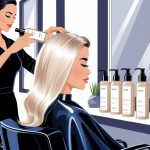Luxury Skincare Secrets Dermatologists Warn Busy Adults Overlook
Supporting Healthy Skin from the Inside Out
It’s 7am, my skin’s still mad about last night’s pizza, and water didn’t help. Every time dermatologists talk about “radiant skin,” they’re not pushing new serums—it’s always about what I’m eating, how much water I forget, and whether I’ve seen a vegetable this week. Science, not wishful thinking.
Nutrition and Hydration
Fries? Never helped my face. Not once. I read somewhere that even mild dehydration wrecks your skin barrier. Dr. Rachel Nazarian said, “Skin health reflects your diet and hydration,” which is true and annoying (SELF’s advice). If I forget my water bottle, by dinner my face looks like a crumpled napkin. I tracked my food for a week. Salad days = less redness. Burger days = disaster. Not scientific, just what I see in the mirror. Vitamin C (bell peppers, oranges), omega-3s (salmon, chia), selenium (Brazil nuts)—supposedly they make skin bounce back. Sometimes I ignore all that, then complain when my moisturizer “doesn’t work.”
The Role of Green Juice and Greens
Greens, again. I’ve forced kale and spinach into breakfast because every derm says to. They talk about chlorophyll and antioxidants, and I’m just thinking about the $12 smoothie at the gym. They claim green juice makes skin less tired. Sometimes, yeah, it helps. One derm in an InstaNatural article says greens plus exercise is basically a DIY facial. I tried skipping greens for a month—breakouts everywhere. I can’t prove it’s related, but I’m not risking it again. Does one green juice fix three days of no sleep? No. But greens do something. Downside: spinach teeth.
How Diet Influences Skin Health
“Superfoods fix everything”—sure, until I stress-snack all week. My derm probably sighs every time I eat a candy bar and call it “healthy.” When I eat more nuts, fruit, and fish, my skin clears up. Less redness, less eczema. Tried keto once, just got dark circles. Extreme diets don’t help. Evidence says anti-inflammatory, balanced diets mean fewer breakouts and better texture. When I actually stick to it, my skin improves. Diet matters more than retinol, honestly. Still, why are cucumbers so boring?
Frequently Asked Questions
Beauty editors always want that “magic step.” Meanwhile, I’m over here forgetting SPF and buying hyped serums that do nothing. Vitamins get ignored, like antioxidants are optional. Research says otherwise, but you never see that in influencer videos.
What essential steps should I never skip in my daily skincare routine?
I skipped moisturizer for three days after someone said “oily skin doesn’t need it in winter.” Lies. Dehydration hits everyone. Dermatologists keep repeating: sunscreen (SPF 30+, broad spectrum), gentle cleanser, basic moisturizer with ceramides (which you never find in hotel samples). Dr. Mahto told The Handbook that skipping SPF leads to pigmentation, no matter your skin type. I tried skipping it for errands, and my skin rebelled. Coincidence? Doubt it.
Can over-cleansing harm my skin, and how can I avoid it?
Double cleansing is weirdly trendy, but my face hates it. My derm friend rants about over-cleansing—strip your lipids, then wonder why foundation flakes off. I used a third cleanser sample and my cheeks burned for hours. Fewer products aren’t the answer; it’s about gentle, pH-balanced cleansers (syndet bars are underrated). Lukewarm water only. Hot water and foaming gels? Just don’t. CNN’s experts say over-cleansing is bad, so why did I think I’d be fine?
What are the tell-tale signs of prematurely aging skin I should watch out for?
Fine lines before 30? Rude. Blue light all day, visible pores, skin losing bounce. Rough texture even with hydrating masks—why? Dr. Robinson said on CNN that uneven tone and dull patches are early aging signs, not just crow’s feet. Sometimes it’s just a sleep crease, but if it stays after coffee, I know collagen’s on strike.
How do lifestyle factors like diet and exercise affect my skin’s health long-term?
I used to think antioxidants were just branding, and sugar cravings didn’t show up on my face. Wrong. Two weeks of sad desk lunches, and my skin freaks out. CNN Underscored says diet “sort of” matters, but dermatologists blame high-glycemic foods for breakouts. If I actually run a few miles, my skin glows more than after any mask. Skip exercise for a week? Sallow, tired skin. I even track it in a spreadsheet called “vanity metrics.” No shame.
What are the most effective anti-aging ingredients I should look for in skincare products?
Every brand pushes retinol or peptides, but which ones work? Experts love retinoids (prescription if you can), vitamin C for daytime, niacinamide for “barrier support,” hyaluronic acid for mornings when my skin’s extra thirsty. Every year, more buzzwords, less clarity. From experience—peptides don’t do much unless the formula’s good, and if vitamin C isn’t in a dark, airtight bottle, it’s basically useless. Learned that the hard way.
How often should I really be changing my skincare products, and why?
Honestly, who actually tracks this? I keep seeing, “switch it up with the seasons,” everywhere—like my skin’s supposed to get a memo from the weather app. Mine just rebels whenever it feels like it. I’ll find a serum I love, it’s magic for two months, and then bam, my face throws a tantrum. Why? No clue. And don’t even get me started on the time I mixed two random acids because some influencer made it sound like a science experiment—ended up with hives, and my dermatologist just sort of side-eyed me and said, “Maybe don’t play chemist.” Yeah, thanks.
I don’t have the energy to redo my whole lineup every time there’s a new trend or some ingredient gets canceled on TikTok. Twice a year, maybe, if I remember—or if something starts burning (which, yeah, maybe I should take more seriously). If it’s working, why mess with it? Unless you’ve got a thing for chaos or just want to keep Sephora in business.



